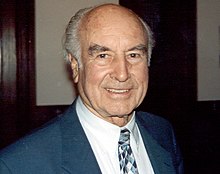Albert Hofmann
| Albert Hofmann | |
|---|---|

Albert Hofmann in 1993
|
|
| Born |
11 January 1906 Baden, Switzerland |
| Died | 29 April 2008 (aged 102) Burg im Leimental, Switzerland |
| Residence | Switzerland |
| Nationality | Swiss |
| Fields | Chemistry |
| Alma mater | University of Zürich |
| Known for | Synthesis of LSD-25 |
Albert Hofmann (11 January 1906 – 29 April 2008) was a Swiss scientist known best for being the first person to synthesize, ingest, and learn of the psychedelic effects of lysergic acid diethylamide (LSD). Hofmann was also the first person to isolate, synthesize, and name the principal psychedelic mushroom compounds psilocybin and psilocin. He authored more than 100 scientific articles and numerous books, including LSD: Mein Sorgenkind (LSD: My Problem Child). In 2007, he shared first place, alongside Tim Berners-Lee, in a list of the 100 greatest living geniuses, published by The Telegraph newspaper.
Hofmann was born in Baden, Switzerland, the first of four children to factory toolmaker Adolf Hofmann and his wife Elisabeth (born Elisabeth Schenk). Owing to his father's low income, Albert's godfather paid for his education. When his father became ill, Hofmann obtained a position as a commercial apprentice in concurrence with his studies. At the age of twenty, Hofmann began his chemistry degree at the University of Zürich, finishing three years later, in 1929. His main interest was the chemistry of plants and animals, and he later conducted important research on the chemical structure of the common animal substance chitin, for which he received his doctorate, with distinction, in the spring of 1929.
Regarding his decision to pursue a career as a chemist, Hofmann provided insight during a speech he delivered to the 1996 Worlds of Consciousness Conference in Heidelberg, Germany:
One often asks oneself what roles planning and chance play in the realization of the most important events in our lives. [...] This [career] decision was not easy for me. I had already taken a Latin matricular exam, and therefore a career in the humanities stood out most prominently in the foreground. Moreover, an artistic career was tempting. In the end, however, it was a problem of theoretical knowledge which induced me to study chemistry, which was a great surprise to all who knew me. Mystical experiences in childhood, in which Nature was altered in magical ways, had provoked questions concerning the essence of the external, material world, and chemistry was the scientific field which might afford insights into this.
...
Wikipedia
